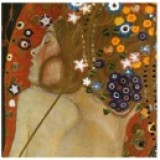WOTD! Silly.
-
Jordan
13 years agoHey, I apologize for the hiatus in this thread. I am a very messy-minded person and sometimes I just sort of...stop...doing things.
In any case, I'd like to take this time to extend an invitation to you. Yes, you!
A lot more gratification comes from this sort of thing, I find, through site participation. That's why I'd like to start seeing requests for future WOTDs. PM them to me, or just post them in here. Your call.
Anyhow, without further anything.
Silly
adj.
Pronunciation:
[SIL-ee]
Definition:
- adjective
1. weak-minded or lacking good sense; stupid or foolish: a silly writer.
2. absurd; ridiculous; irrational: a silly idea.
3. stunned; dazed: He knocked me silly.
Etymology:
O.E. gesaelig "happy" (related to sael "happiness"), from W.Gmc. *saeligas (cf. O.N. saell "happy," Goth. sels "good, kindhearted," O.S. salig, M.Du. salich, O.H.G. salig, Ger. selig "blessed, happy, blissful"), from PIE base *sel- "happy" (cf. L. solari "to comfort"). The word's considerable sense development moved from "blessed" to "pious," to "innocent" (c.1200), to "harmless," to "pitiable" (late 13c.), to "weak" (c.1300), to "feeble in mind, lacking in reason, foolish" (1570s). Further tendency toward "stunned, dazed as by a blow" (1886) in knocked silly, etc. Silly season in journalism slang is from 1861 (August and September, when newspapers compensate for a lack of hard news by filling up with trivial stories). Silly Putty trademark claims use from July 1949.
SIDE NOTE: I've never really addressed this, but if anyone has any questions about the abbreviations within the etymological section, just ask! :)
Quote with the word:
"Well sir, I have a silly walk and I would like to obtain a government grant to help me develop it."
- Taken from a Monty Python skit "The Ministry of Silly Walks." -
Narphangu
13 years agoJORDAN!
So much love coming your way in the form of... sweet guitar chords?
Strange how the meaning changed so much.
Nice quote, btw. -
sibyllene
13 years agoFrom "blessed" to "feeble in mind." Nice!
...which in turn makes me think of the word "nice," which was used with negative connotations before it became positive. In a Jane Austen novel, if someone is called "nice," it means that they are kind of... fake, I think. It's funny (silly?) when words switch meanings! -
Jordan
13 years agoHappens a lot in English! :)
-
Larry Chamberlin
13 years agoMy searches indicate it is used in light hearted kidding to mean the person is silly. I do not know the origin, but it would be interesting if someone knew that.



